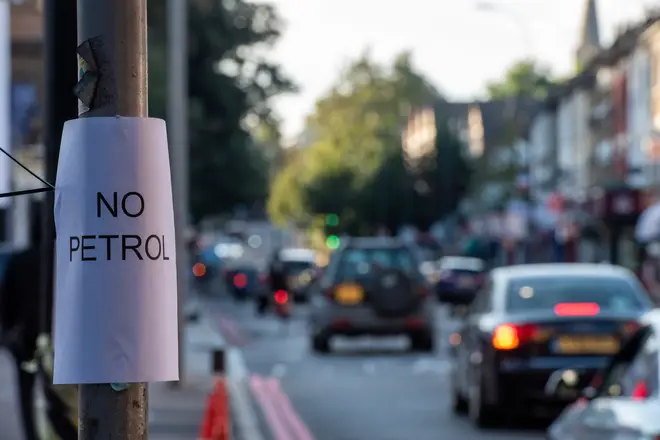
Matthew Wright 7am - 10am
27 September 2021, 11:05 | Updated: 27 September 2021, 12:57

Thousands of people including NHS staff and teachers have said they are unable to get to work due to the fuel shortage crisis, and are facing the prospect of returning to working from home.
A campaign group representing GPs and other NHS workers today said staff have been unable to get to work due to the shortages.
EveryDoctor said some medics had not been able to get fuel after demand shot up by 500 per cent over the weekend amid a shortage of lorry drivers.
Meanwhile London Mayor Sadiq Khan told LBC the shortages will continue for the "foreseeable future" - with shortages at pumps and long queues expected for the next few days "at least."
Mr Khan said: “I think for the next few days at least there is going to be a shortage of fuel. My message to those who don’t need the fuel is ‘please don’t fill up your tank if you don’t need to’.
Matt McDonnell, chief executive of Medicare EMS, which provides 999 frontline support to ambulance services, also said staff have had to cancel shifts because they can't get to work.
One headteacher claimed she had to pay for taxis in order for her teachers to get to school on Monday morning.
Another school warned parents they might have to return to home learning despite having "no desire" to do so. It warned of staff being unavailable and possible disruption to food supply for kids' lunches.
It comes after reports Boris Johnson was considering drafting in the army to put an end to the chaos at petrol stations which has even seen scuffles break out on some forecourts. But this was shot down by Environment Secretary George Eustice who said the Government has "no plans at the moment" to use the Army.
EveryDoctor called for the government to “urgently” disclose its plan to prevent the fuel shortages. Chief executive Dr Julia Grace Patterson said: “Doctors and other healthcare workers cannot care for patients if they cannot get to work.
"I am hearing from many today who have spent the weekend unsuccessfully trying to find petrol.”

Sadiq Khan urges those who don't need fuel not to fill their tanks
Dr Patterson went on: "Our health secretary Sajid Javid has been critical of telephone consultations recently – he clearly believes face-to-face appointments are necessary.
"We therefore need to know urgently what the government's plan is to ensure that all NHS staff can reach their workplaces safely during this fuel crisis.
"Doctors are desperately concerned about patients and the government must take responsibility and find a solution."
In an interview with LBC, mayor of London Sadiq Khan urged motorists not to buy fuel if they don't need it.
"Think of the care worker looking after your mum and dad, think of the hospital staff that need to get to hospital because public transport doesn't serve their hospital."
Meanwhile, Gemma Penny, a headteacher in Derby, wrote on Twitter that fuel shortages are now having a greater impact on schools than COVID-19 disruption.
“I have had to offer to pay for taxis to ensure staff get to work tomorrow,” she wrote. “Really people.”
Read more: Army could be sent in to fix fuel crisis as fears grow it could last a week
A self-employed electrician also said "idiots" panic-buying fuel have "directly taken food off the table" for his wife and son.
Roland McKibbin, 31, from Beckenham, south-east London, told PA he had only managed to reach one job on Monday morning.
He said: "I rely on fuel to travel to jobs, no fuel means I can't drive, which means I can't get to jobs with my tools.
"So, basically, the panic-buying idiots have lost me income, and directly taken food off the table for my wife and five-year old son, because I can't wire people's houses from home unfortunately."
Emergency measures were triggered on Sunday evening, with business secretary Kwasi Kwarteng choosing to suspend competition laws for the fuel industry to allow suppliers to target filling stations running low.
Mr Kwarteng opted to temporarily exempt the industry from the Competition Act to allow it to share information so it can target areas where fuel supply is running low.